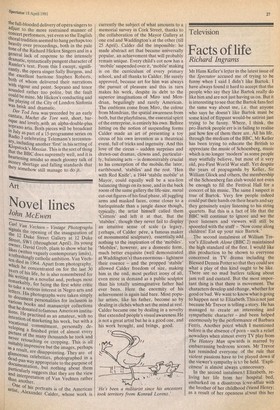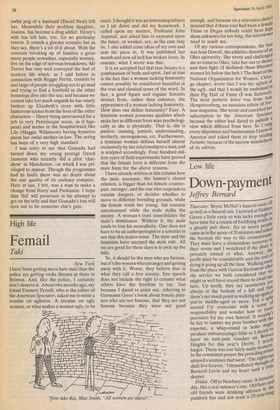Television
Facts of life
Richard Ingrams
Mr Hans Keller's letter in the latest issue of the Spectator accused me of trying to be funny when I said I didn't like Bartok. I have always found it hard to accept that the people who say they like Bartok really do like him and are not just having us on. But it is interesting to see that the Bartok fans feel the same way about me, i.e. that anyone who says he doesn't like Bartok must be some kind of flippant would-be satirist just trying to be funny. Wherp, I think, the pro-Bartok people err is in failing to realise just how few of them there are. All his life, through the medium of the BBC, Mr Keller has been trying to educate the British to appreciate the music of Schoenberg, music which is no longer 'modern' as some people may wistfully believe, but most of it very old, pre-First World War stuff. Yet despite the years of propaganda by Keller, Sir William Glock and others, the membership of the Schoenberg fan club would not even be enough to fill the Festival Hall for a concert of his music. The same I suspect is true of Bartok. Very few people indeed could put their hands on their hearts and say they genuinely enjoy listening to his string quartets. But this is a fact of life that the BBC will continue to ignore and we the poor listeners and viewers will still be spoonfed with the stuff — 'Now come along children! Eat up your nice Bartok.'
The second instalment of William Trevor's Elizabeth Alone (BBC 2) maintained the high standard of the first. I would like this production to be shown to everyone concerned in TV drama including the Blessed Dennis Potter so that they could see What a play of this kind ought to be like. There are no mad butlers talking about jam roll and custard. But the most important thing is that there is movement. The characters develop and change, whether for good or bad. We want to know what is going to happen next to Elizabeth.This is not just because Mr Trevor is telling a story. He has managed to create an interesting and sympathetic character — and been helped enormously by the performance of Barbara Ferris. Another point which I mentioned before is the absence of porn — such a relief nowadays when almost every TV play from The History Man upwards is marred by embarrassing bedroom scenes. Mr Trevor has reminded everyone of the rule that violent passions have to be played down if the viewer's sympathy is to be held. 'Explicitness' is almost always unmecessary. In the second instalment Elizabeth, reliving her life from her hospital bed, embarked on a disastrous love-affair with the brother of her childhood ieriend Henry; as a result of her openness about this her awful prig of a husband (David Neal) left her. Meanwhile their problem daughter, Joanna, has become a drug addict. Henry's wife has left him, too, for no particular reason. It sounds a gloomy scenario but as they say, there's a lot of it about. With the constant breaking up of families a great many people nowadays, especially women, live on the edge of nervous breakdown. Mr Trevor has very Well .conveyed the feel of modern life which, as I said before in connection with Reggie Perrin, consists by and large of people struggling not to go mad and trying to find a foothold as the other lemmings dive into the sea; and because we cannot take too much anguish he has wisely broken up Elizabeth's story with little humorous scenes from the lives of the other characters Henry being interviewed for a job (a very Perrinesque scene, as it happens) and scenes in the hospital ward, like Lily (Maggie Wilkinson) having hysterics about her awful mother-in-law. The acting has been of a very high standard.
I was sorry to see that Granada had turned down my young protégé Derek Jameson who recently did a pilot 'chatshow' in Manchester, on which I was privileged to appear. Though the programme had its faults there was no doubt about the star quality of its cockney compere. Here at last, I felt, was a man to make a change from Harty and Parkinson. I hope that 'Sid' will persevere in his attempt to get on the telly and that Granada's loss will turn out to be someone else's gain.







































 Previous page
Previous page